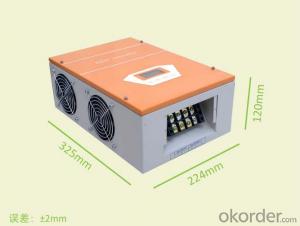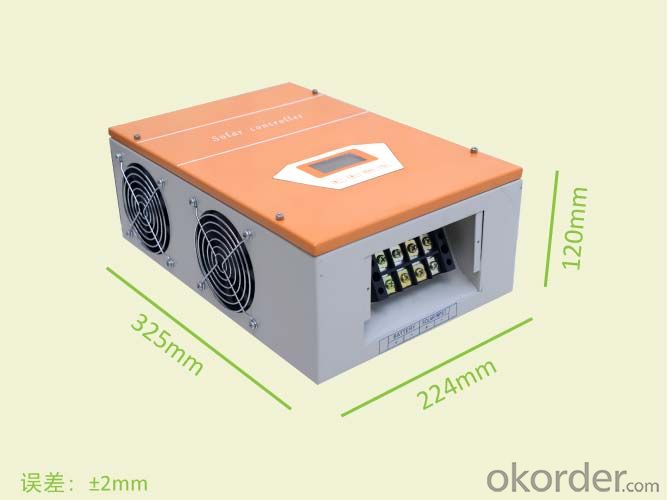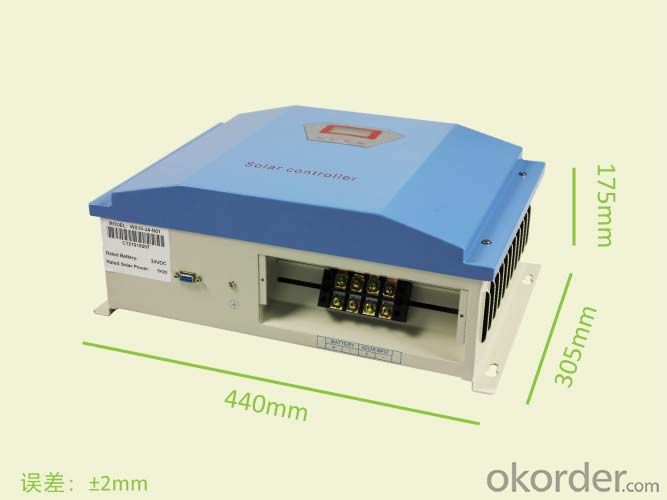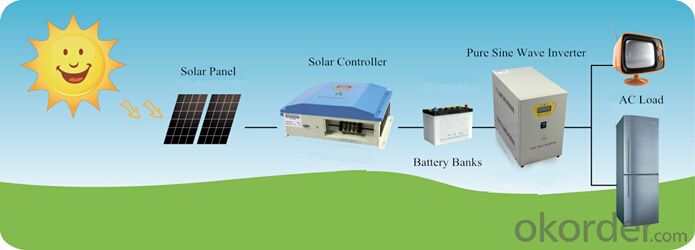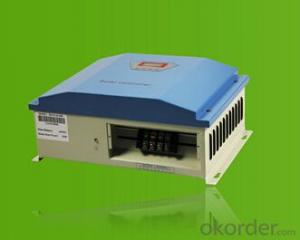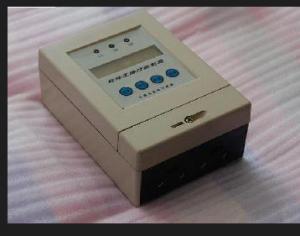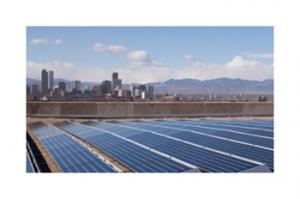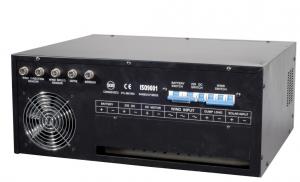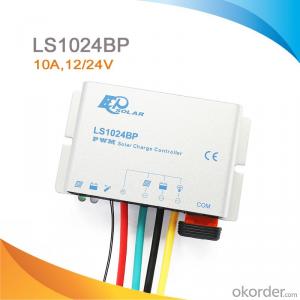Solar Hot Water Controllers with 3kW MPPT Solar Charge Controller
- Loading Port:
- Shanghai
- Payment Terms:
- TT or LC
- Min Order Qty:
- 1 unit
- Supply Capability:
- 10000 unit/month
OKorder Service Pledge
OKorder Financial Service
You Might Also Like
I. PRODUCT INTRODUCTION
Solar controller is control device which can control solar panel and transform solar energy into electricity then store to the battery bank. Solar controller is the most important part in off-grid system, whose performance has much effect on life expectancy and operation of the whole system, especially the battery expectancy. Or battery service life will be shortened by over charge or over discharge.
II. PERFORMANCE FEATURES
Superior military-grade components to ensure the product stability.
Perfect protection function, thus the system has higher reliability.
Check and set all operation parameters as requirement from LCD display.
PWM stepless unload mode, which burn the excess power into Dump load, making the battery charging in best status.
III. APPLICATION AREAS
Standalone Photovoltaic power station
Standalone Domestic household photovoltaic power system
Mobil communication base stations, expressway and other non-residential regions.
Coastal islands, remote mountainous, border posts for regions shortage of or without electricity.
Government demonstration projects, landscape lighting project etc.
IV. 3KW TECHNICAL PARAMETERS
Product model | WS30-48-N00 | WS30-96-N00 | WS30-110-N00 | WS30-120-N00 | WS30-220-N00 |
Rated battery power | 48V | 96V | 110V | 120V | 220V |
Rated solar input power | 3kW | 3kW | 3kW | 3kW | 3kW |
Floating charge voltage | 58V | 116V | 133V | 145V | 266V |
Max Open Circuit Voltage | 100V | 200V | 230V | 250V | 458V |
Dimensions (L x W x H) | 442×307×172 mm | ||||
Net weight | 7kg | ||||
Display mode | LCD | ||||
Cooling | Fan | ||||
Protection level | IP20(Indoor) | ||||
Quiescent current | ≤20 mA | ||||
Protection functions | Battery over charge; battery anti-reverse-connection; solar reverse charge protection; solar anti-reverse-connection; lightning protection. | ||||
Ambient temperature | -20~+55℃ | ||||
Ambient humidity | 0~93%, without condensing | ||||
Working altitude | ≤4000m | ||||
In order to serve our customers better, our company can adjust parameter configuration according to customer’s requirement. | |||||
V. APPENDIX
Optional Functions | ||
Ø Temperature compensation function | Ø Dry-connect output signal function | Ø RS communication function |
Optional Accessories | ||
Ø Ethernet Module | Ø GPRS | Ø SD card storage module |
Ø RS485-USB converter | Ø RS485-RS232 converter | Ø RS232-USB converter |
Friendly reminder: Customers, who will order the solar controller, need to provide the following information | ||
Ø Rated battery voltage | Ø Rated solar power | Ø With or without additional functions |
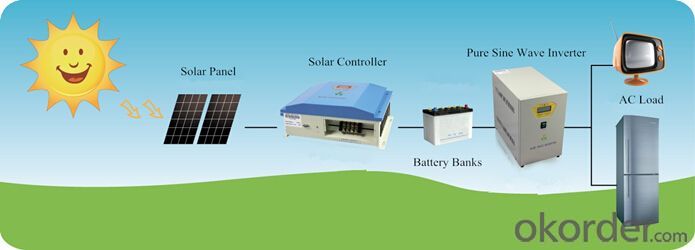
- Q: Can a solar controller be used with solar-powered agricultural equipment?
- Yes, a solar controller can be used with solar-powered agricultural equipment. A solar controller regulates and optimizes the charging and discharging of batteries in the solar system, ensuring efficient energy management. It is essential for controlling the flow of power from the solar panels to the equipment, protecting the batteries from overcharging, and extending their lifespan. Therefore, a solar controller plays a crucial role in the effective operation of solar-powered agricultural equipment.
- Q: Can a solar controller be used in off-grid applications?
- Yes, a solar controller can be used in off-grid applications. In fact, it is an essential component in off-grid systems as it regulates the charging and discharging of batteries, ensuring optimal energy storage and utilization from solar panels. The solar controller helps to prevent overcharging, over-discharging, and other potential issues, making it a crucial component for off-grid power systems.
- Q: What is the load current rating of a solar controller?
- The load current rating of a solar controller refers to the maximum amount of current that the controller can handle when supplying power to a load, such as lights or appliances. It is typically specified by the manufacturer and can vary depending on the model and design of the controller.
- Q: Can a solar controller be used in a solar-powered interplanetary travel system?
- Yes, a solar controller can be used in a solar-powered interplanetary travel system. A solar controller is responsible for regulating and optimizing the charging and discharging of batteries within a solar power system. In an interplanetary travel system, solar panels would be used to harness the energy of the sun, and a solar controller would be essential to manage the power flow, ensure efficient energy storage, and protect the batteries from overcharging or discharging.
- Q: How does a solar controller handle power fluctuations in the grid-tied system?
- The solar controller is a vital part of a grid-tied system that assists in managing power fluctuations from the grid. When power fluctuations occur, such as sudden voltage spikes or drops, the solar controller acts as a mediator to stabilize the power flow between the solar panels and the grid. One of the main functions of a solar controller is to monitor the grid's voltage and frequency. It continuously measures the incoming power and compares it to the acceptable range of values that have been predefined. If the voltage or frequency deviates from the set parameters, the solar controller takes appropriate measures to mitigate the fluctuations. If there is a power surge from the grid, the solar controller uses various protective mechanisms to safeguard the system. It can temporarily disconnect the grid connection or utilize surge protection devices to prevent the excess voltage from damaging the solar panels or other connected equipment. Likewise, if there is a sudden drop in the grid voltage, the solar controller can regulate the power flow to compensate for the lower input. It may adjust the inverter settings or temporarily disconnect the grid connection if the voltage falls below a certain threshold. This prevents potential harm to the solar panels and ensures a stable power supply to the connected loads. In addition, the solar controller plays a critical role in maintaining the stability of the grid-tied system during grid outages. In such cases, the solar controller is programmed to immediately isolate the system from the grid to prevent back-feeding, which could pose a risk to the utility workers attempting to restore power. Once the grid is restored, the solar controller verifies the stability before re-establishing the connection. Overall, the solar controller effectively handles power fluctuations in a grid-tied system by constantly monitoring and regulating the power flow. Its ability to detect deviations, provide protection against surges or drops, and maintain grid stability makes it an essential component for a dependable and efficient solar energy system.
- Q: What is the maximum temperature range that a solar controller can handle?
- The maximum temperature range that a solar controller can handle varies depending on the specific model and manufacturer. However, as a general guideline, most solar controllers are designed to operate within a temperature range of -40°C to +85°C (-40°F to +185°F). These temperature limits are set to ensure optimal performance and protection of the controller's internal components. It is important to note that exceeding the specified temperature range may result in reduced efficiency or even damage to the controller. Therefore, it is crucial to carefully consider the environmental conditions and select a solar controller that can withstand the expected temperature range of the installation location.
- Q: Can a solar controller be used with a solar-powered water pumping system?
- Yes, a solar controller can be used with a solar-powered water pumping system. A solar controller helps regulate the flow of electricity from the solar panels to the pump, ensuring optimal performance and protection against overcharging or excessive voltage. It allows for efficient operation and control of the water pumping system, maximizing the use of solar energy.
- Q: Can a solar controller handle power surges from the inverter?
- Yes, a solar controller is designed to handle power surges from the inverter. It acts as a protective device by regulating and stabilizing the power flow from the inverter to ensure that the solar system operates efficiently and safely.
- Q: Can a solar controller be used in a solar-powered medical equipment system?
- Yes, a solar controller can be used in a solar-powered medical equipment system. A solar controller regulates the flow of electricity from the solar panels to the equipment, ensuring optimal charging and preventing overcharging or damage to the batteries. It helps in maintaining a stable power supply, making it suitable for use in solar-powered medical equipment systems that require reliable and uninterrupted power.
- Q: Can a solar controller be used with solar-powered irrigation systems?
- Yes, a solar controller can be used with solar-powered irrigation systems. A solar controller helps regulate the power output from solar panels and ensures optimal charging of batteries, which are typically used to store energy for irrigation systems. By using a solar controller, the system can efficiently utilize solar energy to operate the irrigation system.
Send your message to us
Solar Hot Water Controllers with 3kW MPPT Solar Charge Controller
- Loading Port:
- Shanghai
- Payment Terms:
- TT or LC
- Min Order Qty:
- 1 unit
- Supply Capability:
- 10000 unit/month
OKorder Service Pledge
OKorder Financial Service
Similar products
Hot products
Hot Searches
Related keywords
